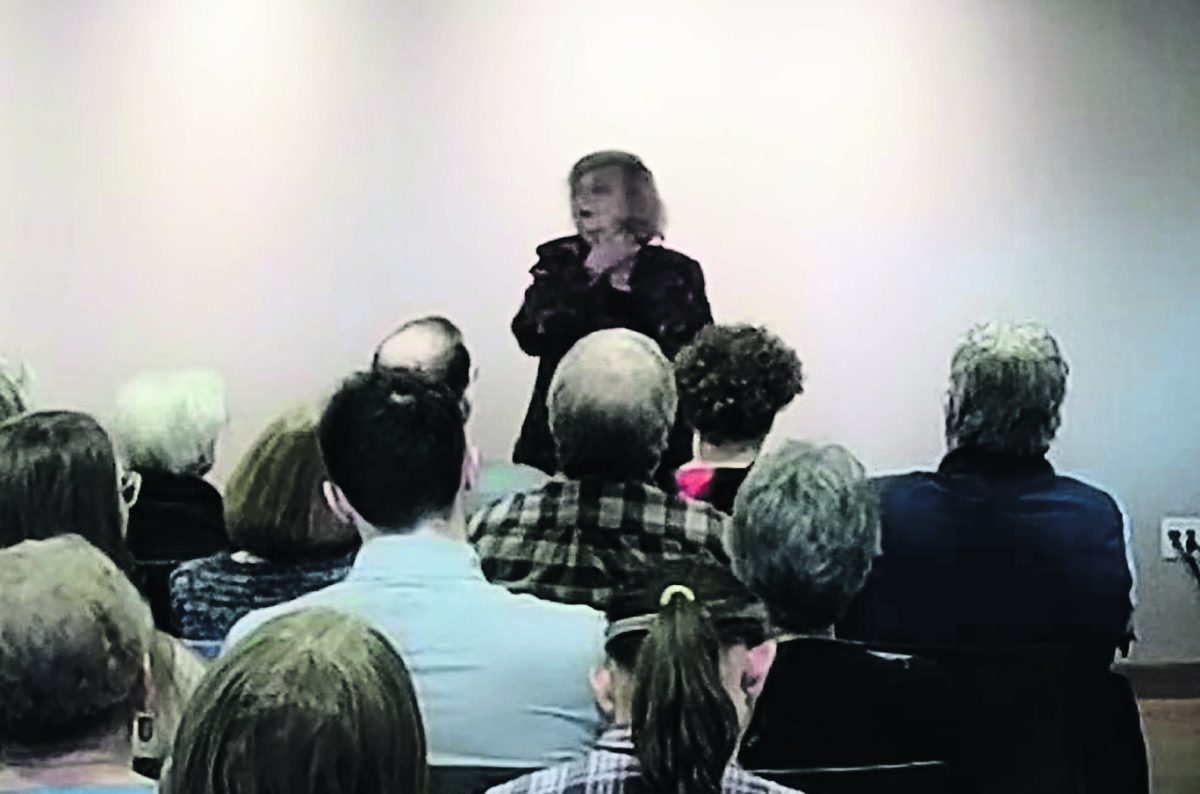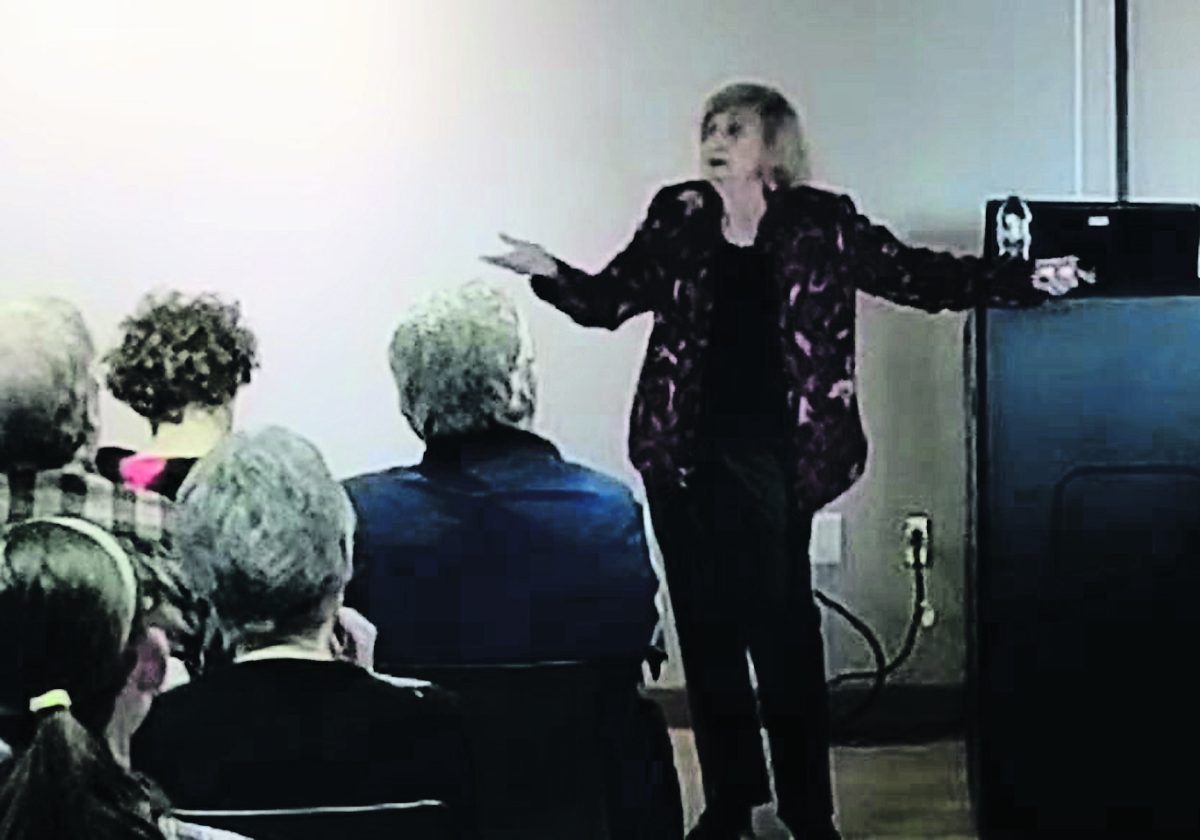Tova Friedman, one of the youngest living survivors of the Holocaust, presented her story at Cornell College Monday, March 27.
Friedman was roughly 4 when the liquidation of a Jewish ghetto where she lived with her family in Central Poland happened, and she and her family were sent to a Nazi labor camp.
One of the messages Friedman wanted to get across – the Holocaust was not a random action.
“This was a plan made by the Third Reich,” Friedman said. “It wasn’t done by simple people, it was a plan made by intellectual and brilliant people.”
Friedman said that the Holocaust focused on eradication of Jewish people as well as many undesirable people, with a goal of creating a superior race.
Friedman said when Germany invaded Poland, the first ones in many of the villages were killing children and the elderly.
“Their goal was to leave no witnesses,” Friedman said.
Friedman’s mother came from a family of nine children. After World War II, only she and four of her siblings had survived.
After eradicating the children, the next targets were anyone 50 or older, as they wouldn’t be able to work in camps as well as younger people.
“How do you kill a nation?” Friedman asked. “If you break up your family, you break up the people. You kill the children and grandparents, who is left? The population just saw you kill their children and elders.”
Friedman survived through the first and second waves in that village, and then witnessed the ghetto destroyed.
She saw her grandmother die in front of her.
“My mother wanted me to see that to remind me of the importance of following the rules to survive,” Friedman said.
She said that her experience in that one ghetto happened countless times in other communities, with mass graves being dug.
Information, including radio and newspapers was also shut down in many of their countries.
After the ghetto was shut down, she and her family were moved to a labor camp in Poland.
Her mother worked in a munitions portion of the camp, while her father dug graves.
Friedman remembers the camp had four towers, at the top of which were German soldiers with machine guns.
Her mother gave her advice on how to survive – including avoiding eye contact with German soldiers, move out of the right of way when Germans are coming at you and listen to their orders.
“The entire time you are living a nightmare you can’t wake up from because you don’t know the rules,” she said. “My mother took me to some of the public shootings again to remind me of the importance of obeying the rules.”
For a period, during a time when the Germans were rounding up children, Friedman hid in the village alone for more than a week. When she returned, she was one of just a few remaining children.
At that time, she and her family were being loaded on train cars headed to Auschwitz and Birkenau.
She recalled the travel to the camps, being packed in cattle cars with hundreds of other people.
It was extremely hot and she and others were thirsty. She slept standing up.
When they arrived at Auschwitz, they shuffled past bodies of those who had died, as well as vomit and feces from the journey.
Her clothes and were taken, her hair was shaved and shoes were taken and she was assigned to a middle bunk with her mom.
She recounted that she had to learn to control her bladder, as they were only allowed to go to the facilities twice a day. Friedman also recounted when she tried to use one of the toilets, she ended up falling into the latrine into feces and urine that came close to her neck.
Within a short time of arriving at Auschwitz, Friedman came down with an illness, most likely typhus. She was separated from her parents and sent to a medical wing, and then a children’s camp at the facility.
She received her tattoo.
She also recounted the one time she was sent to the crematorium. The morning of, the children were fed a breakfast like cereal.
Friedman was one of very few children who were sent to the gas chambers but were not gassed.
Shortly after is when the Russians were advancing into Germany. Friedman and her mother hid among corpses, avoiding the death march that Germans were forcing many prisoners to take as they marched towards Berlin, more than 300 miles away.
Friedman was one of the children who was photographed right next to Michael Borenstein, a holocaust survivor who spoke at Cornell in 2022.
During the question and answer period, Friedman described how she and her parents and other family were reunited following the war.
“There was an unwritten rule to return to the last place you saw people alive, which meant we returned to our hometown in Poland,” Friedman said.
When her father returned, they slowly built a small shop, earning money to sneak to Germany and a chance to immigrate to the United States. When her family arrived at the American camp in Berlin, that was when she felt the most safe. They spent three years in a displaced persons camp before they were sent to the United States.
She was asked how she adjusted to life after the Holocaust.
“You think I adjusted?” she joked.
She was a great student in school and met her husband and, as they grew their family in the United States, that helped her heal very easily.
“I never had survivor’s guilt, but rather a responsibility to share my story and let people know what has happened in the past,” Friedman said. “I’ve also lived by the lesson of leaving a place a little better than you found it.”
Things in today’s world that concern her include the rise of antisemitism again.
She said that as she has gotten older, she has gotten less critical of the portrayals of the Holocaust.
“There’s no way anyone will ever capture every aspect of the story,” Friedman said. “What I’ve told people here is only a quarter of what happened to me in those camps. People making movies are doing their best. It’s easy to be critical. It’s not always easy to be creative.”
Friedman also notes that one of the experiences that has always stuck with her was meeting a classmate in school who complained about the difficulty of piano lessons at a young age.
“It was a moment of encountering two different worlds happening at the same time,” she said. “When she was struggling with learning the piano, I was in a concentration camp. I look at the same scenario unfolding now, as I watch many young Ukrainian children in shelters, that they are having their different experience in the world. I’m witnessing that, as I eat toast at breakfast, on the news stations and think of those poor kids and what they are experiencing.”
Tova Friedman recounts the experiences in a labor camp for a youth. She was 4 when Poland was invaded by Germany and 6 and a half when she and others were finally liberated from Auschwitz.


